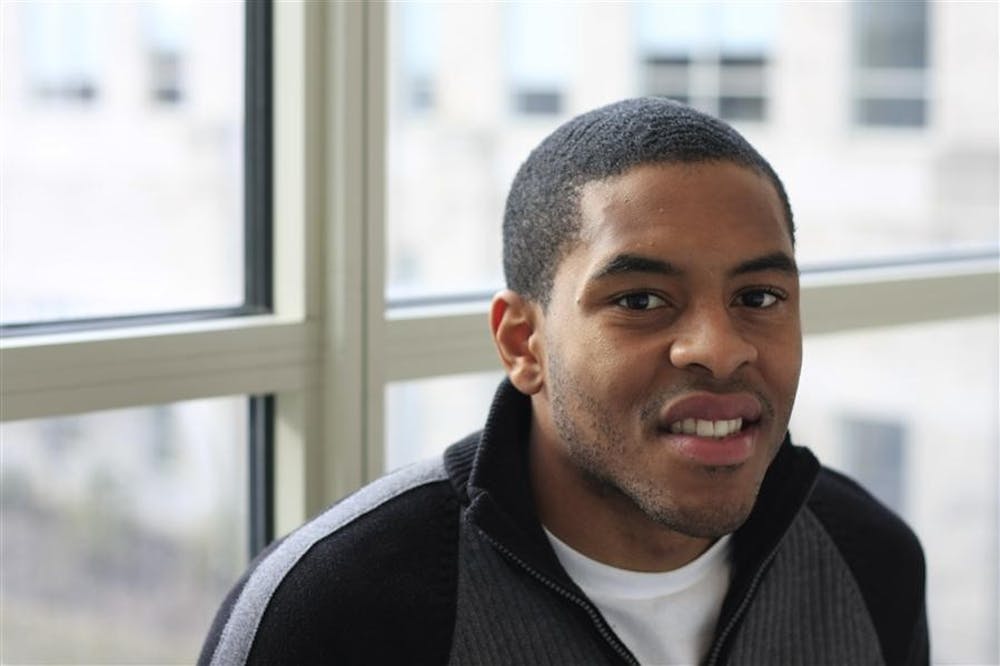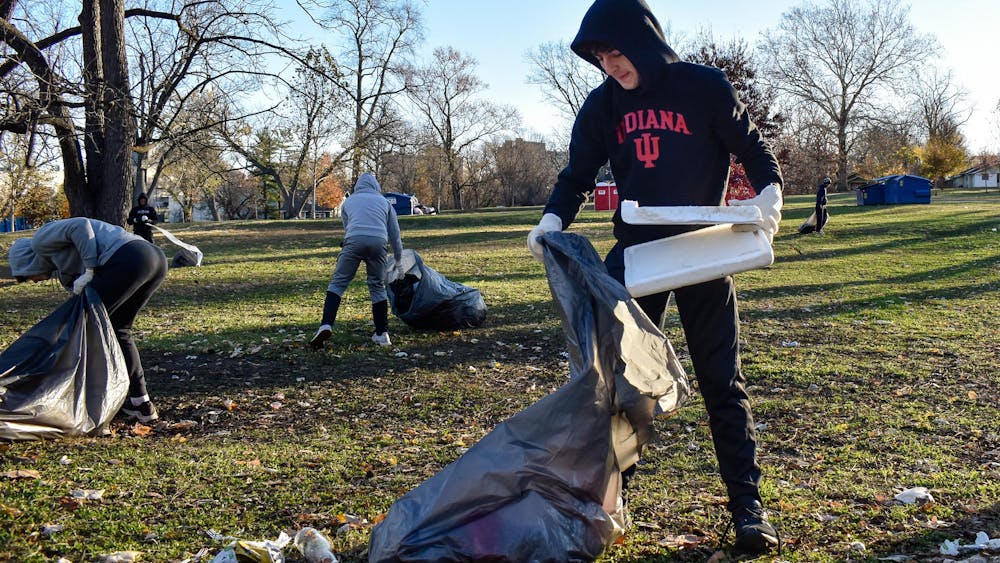As part of Black History Month, the Indiana Daily Student talked to seven black student leaders from across campus. Here is a snippet of how these leaders impact the University each day.
Aaron Barnes
Growing up in Kokomo, where the black population is less than 11 percent, junior Aaron Barnes found a weekend at IU refreshing.
He attended the Men & Women of Color Leadership Conference one weekend during his senior year in high school and said he’d never been in the company of that many other black men who were also forward thinking.
“Everyone was like, ‘I still have a good time, but I know how to put business before pleasure,’” he said. “It gave me justification for what I was doing in Kokomo.”
When Barnes came to IU, he co-founded the Men of Color Leadership Institute, which helps support the conference and creates a home for men who want to better themselves. Although he said the conference was awesome when he attended, he wanted to make it even better for future students.
Ever since deciding to attend IU, Barnes said he has been fascinated by the transition period students go through between middle school and high school and the process of choosing a university.
By helping with the intensive freshman seminars and working for the Office of First Year Programs, Barnes spent two years selling IU to high school students.
Barnes and his fellow brothers of Kappa Alpha Psi Fraternity are planning a weekend for middle school students in April during which they will stay in the Forest Quad lounges and attend social events, tour the campus and learn about admission standards.
At the end of the weekend, the students will receive neck ties donated from students so they can look the part professionally.
Barnes said the University does a good job targeting high school students, but especially with black students, the fraternity wants to plant seeds early.
“We’re trying to reel them in during middle school,” he said. “Which is when you can often lose them.”
Michael Coleman
When senior Michael Coleman looks out his window at the IU Student Association office, he can see the Groups office, the program that brought him to IU.
As an incoming freshman, Coleman was president of the Groups program, a seven-week program that orients first-generation students to IU.
Now as IUSA president, the experience was the first of a long list of leadership positions for Coleman. Before becoming IUSA president, he was vice president of Teter Quad his freshman year, president of Teter Quad his sophomore year and vice president of internal affairs for Residential Halls Association his junior year. He was even one of the students chosen to have lunch at Pizza Hut with Michael McRobbie on his first day as IU president.
Running for IUSA president was grueling, Coleman said. During campaigning, Coleman was told he wasn’t a good representation of the greek community even though he’s a member of the historically black fraternity Alpha Phi Alpha Fraternity.
“It was interesting that someone would say that Michael Coleman wasn’t going to represent the greek community,” he said. “That person apologized, and we put it behind us.”
Now as president of IUSA, Coleman receives about 50 e-mails a day, and he said he has to dress up more times than he would normally like. His office is home to a photo of President Obama from when the latter visited campus; a photo of zipcars, which IUSA funded; a map of Israel; and a jar of sand from his fraternity. He said it’s tradition to hand over the sand when new members are inducted.
His time is filled with three to five meetings a week, and even though he doesn’t have classes on Friday, he’s often in his office from noon to 6 p.m.
“The best way to simplify it is I’m the person who gets all the e-mails and makes sure we’re on it,” he said.
Jasmine Collins
Senior Jasmine Collins was elected president of Theta Nu Xi Multicultural Sorority only a month after she was inducted.
“I think the biggest thing I was worried about was people wouldn’t listen to me because I was new, but that’s not true,” she said.
Two years later, Collins has stepped down as president, and she’s facilitating the transition of the new president who is also a new member. She said she wanted to step down as a senior so she could offer support to the new executive board and show them the ropes before she graduates.
This past week, the sorority put on events each night that represented a different tenant of the sorority: scholarship, service, sisterhood, leadership and multiculturalism. The group donated books to Midwest Pages to Prisoners Projects and worked a three-hour shift and organized a panel discussion between Hillel, the Muslim Student Union and the Impact Movement. The tough part: the sorority only has four members.
“Putting on seven events in a week with only four members is pretty time-consuming,” she said.
But Collins said she likes being in such a small organization because she’s grown to know her sisters well.
“I really like that they uphold the tenants, and they’re very accepting,” she said. “They don’t expect you to change who you are to join.”
Esther Uduehi
When asked what takes up the most of her time, senior Esther Uduehi didn’t say her presidential internship or the Board of Aeons — she said “Glee.”
The Rhodes Scholar watches a lot of television. She starts the year with a list of about 30 shows, and 10 usually get canceled, but this year, few were canceled.
“It’s starting to get a little ridiculous,” said Udeuhi, who also loves “Modern Family” and “The View.”
Uduehi’s addiction to TV is like her addiction to school activities. She’s currently the presidential intern, a Board of Aeons member, co-founder of the IU Photography Society, president of the Minority Association of Pre-Medical Students, tour guide for the IU Art Museum, chemistry researcher, and the list goes on.
Uduehi said she’s always been a very involved student, staying at her high school until ridiculous hours. She said she often has a hard time saying no to new organizations.
“IU offers so many activities, but being able to navigate through them is the hardest part,” she said.
However, Uduehi said if she wants to do something new, she finds a way to fit it in, even if that means watching less television each day.
But her work ethic is what earned her the Rhodes Scholarship.
Uduehi studied in the University of Oxford for a semester during her junior year, and she said she can’t wait to be back. In Oxford her pace was slower. She rode her bike everywhere and didn’t worry about the responsibilities that awaited her at IU. She was able to relax.
She also grew close to many of the first-year students, and when she returns in the fall, she’ll be able to reunite with them.
Heather Savage
Heather Savage said the largest frustration of being president of the Black Student Union is keeping people coming back.
One week 50 members will attend a meeting, and another week 15 people will show up.
“It’s hard to plan events and find that support when the numbers change so drastically from the second to the fourth week,” she said.
But Savage said she cares for the Black Student Union and has been involved since her freshman year, moving her way up from helping with a fashion show to education chairwoman, vice president and now president.
“I had a vision for BSU,” she said. “I wanted the African-American population at Indiana University to be more recognized for something other than being African-American on a predominately white campus.”
Savage is also a chaplain for the IU Voices of Hope Gospel Choir. She’s been singing since she was about eight years old in her school and church choirs.
“I stopped for awhile to play sports, but I realized my niche is in singing,” she said.
The choir travels to Richmond, Ind., and to Purdue University and has semester concerts.
“Our purpose is to be a beacon of light on campus and serve the IU community in song,” Savage said.
Tyun Fomby
Sophomore Tyun Fomby said he probably has the best job on campus.
As a Faculty and Staff for Student Excellence Advisory Board member, Fomby has six students that he tries to meet with once a week, often freshmen and
transfers.
“Coming to IU is a bit of a culture shock, so we try to make that transition easier,” Fomby said.
Fomby said he texts or calls his students when he’s free, and they chat about life and classes or go to a basketball game. As a freshman, Fomby had a mentor of his own, and they are still in contact.
“At the end of the day, they’re not mentees, they’re just friends. It’s not work anymore,” he said.
Fomby is also president of the Men of Color Leadership Institute. As a first generation college student, Fomby didn’t know what to expect, but he said the men in the institute became mentors to him and helped him pick his major.
“Say you want to be an education major, but you don’t know much about it,” he said.
“We have members who are education members who can help them and tell them what classes are like.”
Fomby said that many students have a difficult time getting involved on campus, so the institute offers community service so students have something to put on their résumés.
“It’s not about escaping but finding people that look like me and face the same issues,” he said.
Britney McTush
Junior Britney McTush is used to having girls knock on her door and tearfully ask her for advice.
She’s a peer instructor for the Atkins Living-Learning Center, which is for residents interested in African-American history. She is also a member of the Public Relations Student Society of America, the National Association of Black Journalists and Xi Alpha Epsilon Honor Society, and she is a former IDS staff writer.
A few weekends ago, one of McTush’s residents had a birthday, and she said she usually never gets to do anything fun because it’s always cold. McTush made sure she was able to have dinner with her friends by offering to drive.
“There are times when you can tell you’re making a positive difference,” she said.
As a peer instructor, it’s also McTush’s job to teach a class to the residents of her floor on Mondays. She teaches different aspects of black culture and professional development.
“It’s given me not only leadership but also public speaking skills,” she said. “It also has helped my organization because if I’m not ready, it messes up the whole class.”
McTush lived on the floor as a freshman because she knew there wasn’t a large black population on campus and she is usually the only black student in her classes. By living on the floor, she said she knew she’d be surrounded by women with whom she had things in common.
“I wanted to stay in Atkins because I wanted to maintain the relationships,” she said. “It’s interesting to know that was me when I was a freshman. I can see where they need to grow.”
Black student leaders

Get stories like this in your inbox
Subscribe





